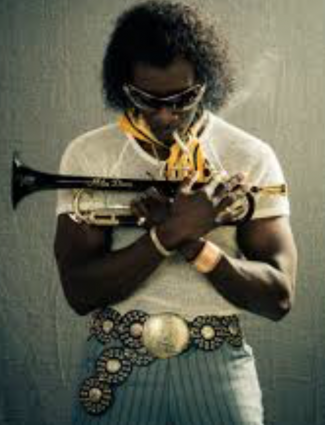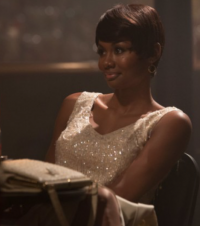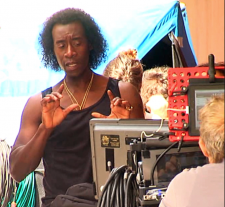 Thelonious Monk once said, “Talking about jazz is like dancing about architecture.” Having dated a jazz trombonist, I know this to be true, but I hadn’t considered until recently that making a movie about jazz might be an equally quixotic process. Free-form if not formless and often wordless, the musical genre asks us to abandon our need for structure and surrender to a purer state. Such trust in audiences is not exactly bottom-line Hollywood’s forte, yet “Miles Ahead,” the new film about Miles Davis, has the remarkable audacity to take all its cues directly from jazz.
Thelonious Monk once said, “Talking about jazz is like dancing about architecture.” Having dated a jazz trombonist, I know this to be true, but I hadn’t considered until recently that making a movie about jazz might be an equally quixotic process. Free-form if not formless and often wordless, the musical genre asks us to abandon our need for structure and surrender to a purer state. Such trust in audiences is not exactly bottom-line Hollywood’s forte, yet “Miles Ahead,” the new film about Miles Davis, has the remarkable audacity to take all its cues directly from jazz.
Perhaps this is why Don Cheadle, who directed, produced, co-wrote the screenplay, and stars as the trumpeter/composer in “Miles Ahead,” had such a tough time financing this film. In interviews, he has called the decade-long effort to get the film produced a “Herculean” task, thanks to lack of interest from financiers. Only with an Indiegogo campaign, his own wallet, and the agreement to add a white co-star did he manage to bring his dream project to screen. For better and worse, this is the only concession Cheadle makes in this impressionistic and sometimes scattershot portrait of a man whose music changed the very way that we listen.
Near the beginning of the film, a late-in-life Miles Davis corrects an off-camera interviewer who refers to his music as “jazz.” “It’s social music,” he says, and though you get the sense Davis enjoys being a contrarian, you also see what he means. The ecstasy he shares with bandmates and listeners is a nonverbal communication – a telepathy of sorts – that threads through all his albums. What’s interesting is that, though non-jazz lovers often complain his music is too esoteric, Davis’s work is actually straight ahead – a brilliant distillation of emotion and mood. It gets to the core of human longing and, though therefore wonderfully complex, never traffics in unnecessary embellishments. “Miles Ahead” sometimes does.
Cheadle’s co-screenwriter is Steven Baigelman, who wrote the also-nonsequential “Get on Up,” that crackling crack-up of a 2014 James Brown biopic. Perhaps because Davis was less of a showboat than the Godfather of Soul, Cheadle and Baigelman resort to a bombastic fictionalized structure that’s rooted in the second half of the 1970s, when the musician, addled by coke and the pain caused by a degenerative hip condition, holed up in his New York home and made virtually no music. Though the script forgoes most of the traditional biopic conventions, it deploys the now-hackneyed device of a prying journalist. An aspiring reporter, Dave Brill (Ewan McGregor, white as can be), gets his foot in the door with Davis by helping him track down an unheard session tape that falls into the hands of swindling record producer Harper Hamilton (Michael Stuhlbarg). Enter a madcap, feature-length dream chase through drug dens, record studios, smoky clubs, swinging parties, and the wilds of Davis’s memory.
The scenes transporting the musician to earlier decades are by far the best. On stage and in his romance with dancer Frances Taylor (stunningly composed Emayatzy Corinealdi), we see how he sees and hear how he hears back when it is all still wonderful. It’s an ocean of hypnagogic images and sounds: a drift of jade green and scarlet piping, a swell of satin and smooth skin, a swoon of blue smoke in which Davis’s trumpet mingles with saxophones, cigarettes, drums, social change, and desire. Imagine an MGM musical by Malcolm X, dining upon a Van Gogh painting – or a dance about architecture. In short, it is everything we could want in a film about jazz. But it is also overwhelming, which is how we come to understand how Davis disassembled.
 At once wild-eyed and self-contained, Cheadle as actor is at his apex, which is really saying something. The man has always channeled fear and anger better than anyone in his generation and he marshals that skill here to capture how Davis used drugs and violence to filter everything the great level of detail he couldn’t help absorbing. As a director and writer, though, Cheadle fails to fully trust us. The he-doth-protest-too-much antics of Davis and Brill in the film’s present are grating at best – late rather than early Scorsese, which is no compliment in my book. “If you’re gonna tell a story, man, don’t be all corny with this shit,” Miles says at one point. I can only imagine what he’d say about the framework in which he’s buried here.
At once wild-eyed and self-contained, Cheadle as actor is at his apex, which is really saying something. The man has always channeled fear and anger better than anyone in his generation and he marshals that skill here to capture how Davis used drugs and violence to filter everything the great level of detail he couldn’t help absorbing. As a director and writer, though, Cheadle fails to fully trust us. The he-doth-protest-too-much antics of Davis and Brill in the film’s present are grating at best – late rather than early Scorsese, which is no compliment in my book. “If you’re gonna tell a story, man, don’t be all corny with this shit,” Miles says at one point. I can only imagine what he’d say about the framework in which he’s buried here.
This was originally published at Signature.
